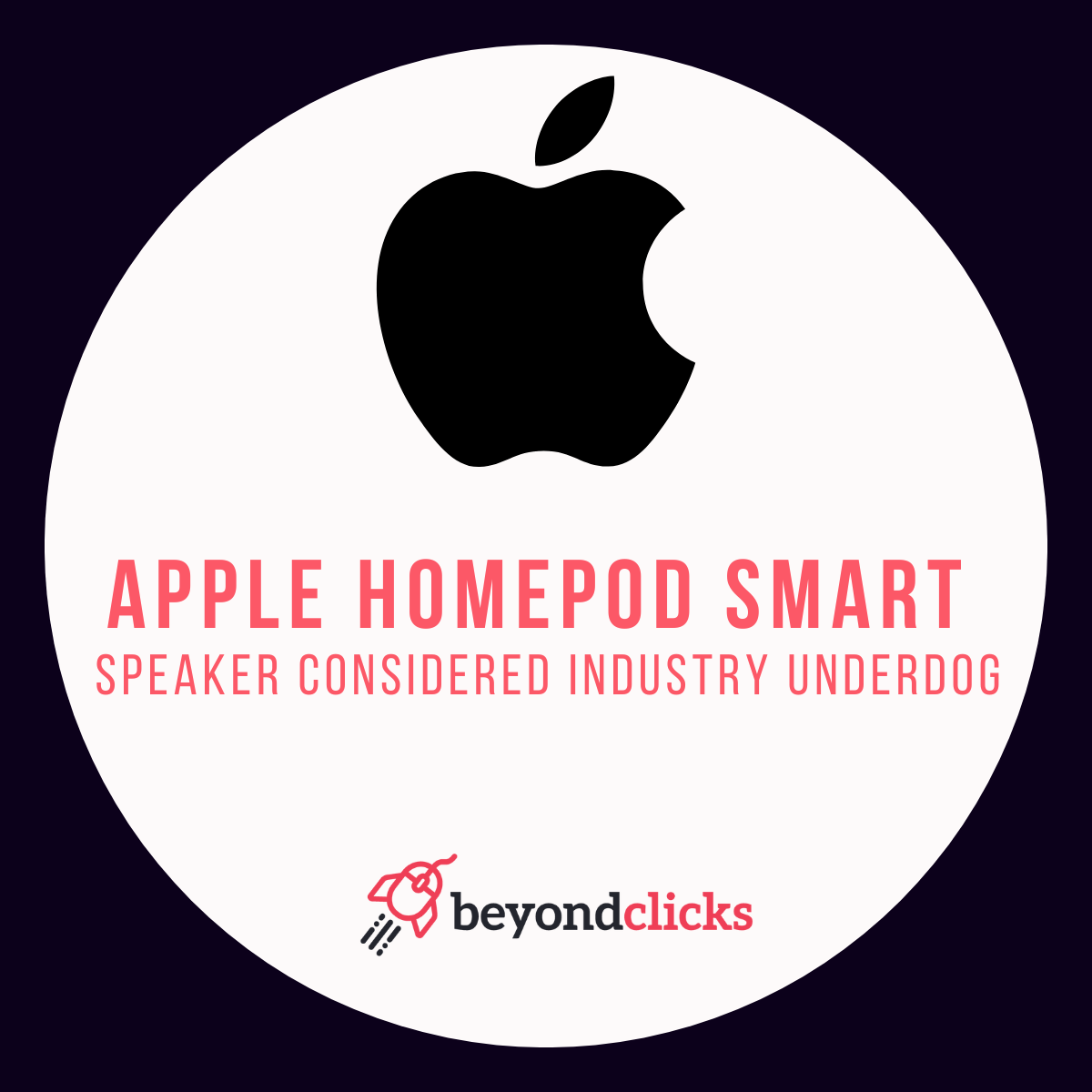APPLE HAS FINALLY ENTERED THE VOICE ASSISTANT MARKET WITH THE HOMEPOD, BUT IS IT TOO LATE FOR THE TECH GIANT TO SOAK UP A MARKET SHARE ALREADY DOMINATED BY AMAZON?
Having missed Black Friday and the Christmas period, Apple is already behind the likes of Amazon and Google, and, as such, is definitely the underdog with its HomePod offering.
While we know that there are millions of Apple fanboys out there who will pay whatever price tag Apple slap on their products (myself included), you don’t have to look closely at the HomePod to know it’s not as advanced in terms of AI (Artificial Intelligence) as Alexa or Google Home.
In the US, an estimated 40 million smart speakers have been sold, the majority of which are Amazon Alexa devices. Of those 40 million, many of them are from the low-end of the market (Google Home Mini and Amazon Echo Dot). Apple do not offer a low-end equivalent, as the HomePod is priced at £349, pitting itself against Sonos, who have a version with Alexa.
33% of Consumers Would Purchase a HomePod
In a survey conducted of more than 2,000 US consumers in June last year, almost exactly one-third of consumers were either ‘interested’ or ‘somewhat interested’ in purchasing an Apple HomePod. That number jumps again to 45 percent for Apple users.
What’s even more surprising is that among Echo and Home owners, 64 percent and 73 percent were ‘interested’, respectively. But, and here’s where the findings contradict themselves, the survey discovered that price was the most important feature to likely buyers.

Apple’s HomePod will retail for £349, whilst an Amazon Echo Dot is priced at £49.99 and Google’s Home Mini is £49.
According to the survey, the following were the rankings of variables amongst those who said the feature was ‘very important’ when considering a voice-controlled assistant:
- 57% price
- 51% speaker/audio quality
- 49% accuracy of device’s voice recognition
- 44% compatibility with devices you may already own, such as your smartphone
- 30% access to a variety of music streaming services
- 29% ability for device to integrate with other services or platforms, such as controlling smart light bulbs
- 29% brand that manufactures the device
- 21% aesthetics or look of the device
What’s Good About HomePod?
Unlike Google Home or Alexa, HomePod won’t make calls, but can hand off phone calls. As far as we can tell, the main use of the HomePod will be for use as a speaker.
“HomePod combines Apple-engineered audio technology and advanced software to deliver the highest-fidelity sound throughout the room, wherever it is placed. This elegantly designed, compact speaker totally rocks the house.”
Containing a high-excursion woofer, six-microphone and seven-tweeter speaker array, the HomePod is vying to become the best way to stream your music library inside your house.
Privacy is a big deal with Apple devices. Most recently, it stopped all its iOS devices and Safari users from being tracked by online advertisers, and, with 12 percent of all smartphones sold worldwide being an iPhone, it has thrown the remarketing world into disarray.
Some privacy concerns have been raised about Google Home and Alexa devices “always listening” or recording conversations in the background, both of which have denied these accusations and sought to assure the public that they’re not “eavesdropping” on device owners.
“With HomePod, only after “Hey Siri” is recognised locally on the device will any information be sent to Apple servers, encrypted and sent using an anonymous Siri identifier.”
What’s Bad About HomePod?
Well, obviously, it’s the price. Apple products have been getting more and more expensive in recent years. For example, you can pick up an iPhone 7 for £549, whereas the iPhone 8, which is pretty much an identical phone, costs £699.
By charging £349, it is aimed at the upper-end of the home speaker market. To put it into context, the most expensive Amazon speaker, the Echo Show, sells for £199, which has a 7-inch screen built into it. Can you really justify spending that much money on a speaker that can’t perform as many actions as its cheaper priced competitors?
Both the Google Assistant and Alexa have far greater abilities than Siri, thanks to a plethora of third-party skills and actions. Whether this may be because they have been on the market longer or not, the HomePod doesn’t appear to do any of the fun things Alexa and Google can do, like play musical chairs or bedtime stories. Apple may add these features over time, but at launch Apple is allowing it to integrate with messaging, list-making and note-taking apps, as well as controlling various smart home products.
You will only be able to play music from either your iTunes library, Apple Music, stream Beats 1 or listen to podcasts without a subscription. Even if libraries are fair game, with Google and Amazon you have access to Spotify, Google Play Music, Tidal, Pandora and Amazon Music.

Verdict
As the HomePod is yet to reach the market (orders open 26th January with deliveries expected from the 9th February), we have yet to see it in action and perform as an everyday assistant.
I am both intrigued and skeptic by Apple’s offering, but the price is a huge issue for me (even though I will end up buying one a few months down the line). I can’t see how it could better either Amazon or Google’s offerings. Whether it’s because they have been on the market longer and are supported by more third-party apps or have better action abilities, Apple is, maybe for the first time in its history, the underdog.
